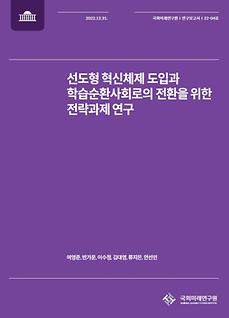
Korea achieved rapid economic growth by effectively learning and adopting advanced technologies and knowledge. However, the limitations of the catch-up growth model are becoming more apparent as the country aims to transition to an innovative economy. To achieve this goal, it is crucial that individuals across different sectors engage in a variety of learning activities, instead of relying solely on specific industries or companies. Additionally, it is important to expand the positive effects of learning to support the adaptability of the workforce. Despite this need, there are concerns that current innovation policy in Korea does not sufficiently support the development of a culture of self-directed learning and lifelong learning, which is necessary for the reinforcement of adaptability through the design of career plans based on individual self-learning and participation in learning activities throughout the life cycle.
With this context in mind, the current study aims to analyze the main institutional limitations and policy issues present within Korea's innovation system, specifically with regards to fostering diverse creative learning and building a learning society. Furthermore, this study aims to propose concrete policy solutions to address these issues and support the transition to a society where creative learning is embraced. To achieve this, the study intends to conduct a comprehensive analysis of policy alternatives and leverage points within various institutions, including Technical and Vocational Education, Workplace-based Learning, Higher Education Institutions, Middle-aged People, Local Communities, and others, from a systemic perspective. Through these efforts, the study aims to identify key policy tasks and long-term visions to support the successful transition of the innovation system, with the ultimate goal of providing guidance for creating a national, forward-looking innovation strategy.